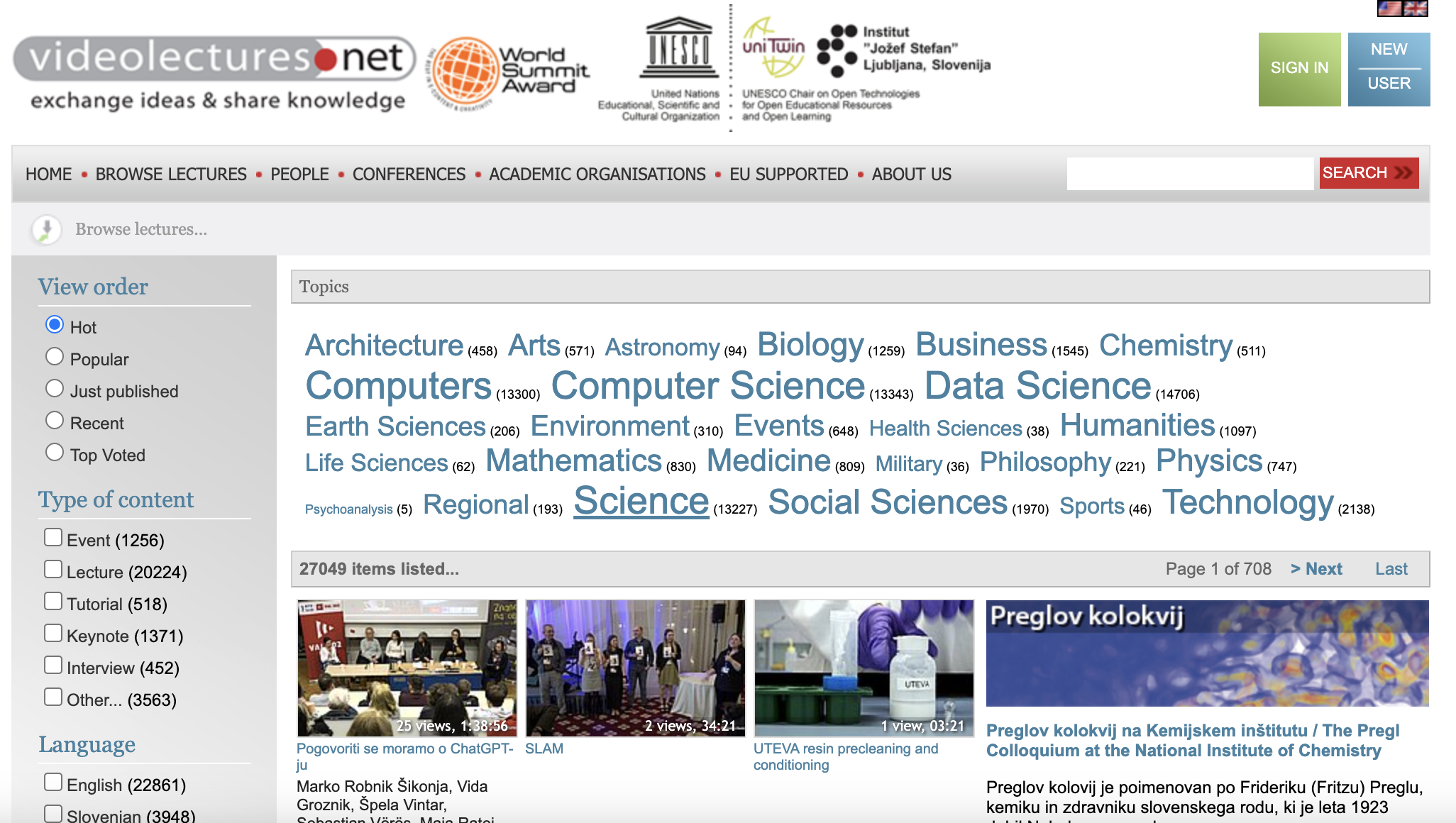AI and the Future of Education: Revolutionizing Learning Experiences
Education is a privileged knowledge domain for UNESCO and also an area where Artificial Intelligence is expected to have great impact, but also where much polemic is taking place. Some of it appears with the release of ChatGPT and the potential to plagiarism and AI-based generation of students’ homework (also discussed here in the SWForum with a more positive perspective than usual). Not that they haven’t had many other online tools to help them on that (e.g., the Wikipedia being one of those plagiarism sources so much talked about when it was released). But the Education sector has also been a target to digital transformation over several perspectives, from the smart school boards to the educational platforms used by institutions affecting a wide range of educational levels. AI has the potential to reshape the landscape of education, unlocking new avenues for personalized learning, adaptive assessments, and intelligent tutoring systems. In this blog post, we will explore the transformative impact of AI on the future of education, discussing its applications, benefits, and the challenges it brings.

Personalized learning is one of the premises brought to public discussion by AI-enabled technologies, allowing for 24/7 assistance and customized learning experiences tailored to the unique needs and abilities of each student. Intelligent algorithms can analyze vast amounts of data, including performance metrics, learning styles, and preferences, to create specific learning paths. Adaptive learning platforms powered by AI can deliver targeted content, provide real-time feedback, and adjust the pace and difficulty level of lessons (if that level is part of the data labeling). This personalized approach could enhance student engagement, motivation, and knowledge retention, enabling learners to thrive at their own pace while addressing their specific learning gaps.
This will surely also affect online platforms of educational resources. One worth mentioning is the UNESCO-awarded Videolectures.net, a free and open access repository of lectures given by distinguished scholars and scientists, aimed at promoting science, exchanging ideas and fostering knowledge sharing by providing high quality didactic contents not only to the scientific community but also to the general public. I have been collaborating with the fantastic team behind this initiative, towards the education of the general public and the professional training in topics related to the sustainable development goals. AI can have a determining role in professional training, particularly if we are able to offer quality didactic materials that can be easily assessed and complement well professional experience.
Intelligent tutoring systems and virtual assistants are also a realistic horizon (discussed earlier in this forum), powered by AI systems (like Siri or Alexa) acting as virtual mentors, providing individualized guidance and support to students. These systems can offer real-time explanations, answer questions, and assist learners in solving problems (much as ChatGPT is already doing over text). By leveraging natural language processing and machine learning, AI virtual assistants can create interactive and immersive learning environments, fostering active engagement and deep understanding. Even intelligent textbooks are now becoming available enhancing the learning experience and taking the side of the student in further improving the “learning companion” role that have always been their aim. But lets not forget that AI should, at an initial stage, reduce educators' efforts not by substituting their function but by handling routine administrative tasks, allowing them to focus on personalized instruction, mentorship, and nurturing critical thinking skills.

On the other hand, machine learning algorithms can offer data-driven insights to students, educators and parents, specifying aspects of the learning procedure if the structure of the latter is designed to capture student progress and learning patterns. In general, these type of algorithms can identify trends, predict learning outcomes, and recommend interventions to support struggling students. Educators can access comprehensive analytics dashboards that provide an overview of class performance, individual student progress, and areas that require additional attention. This data-driven approach empowers educators to make informed decisions, adapt their teaching strategies, and provide targeted interventions, ultimately improving learning outcomes and optimizing instructional practices. Can these substitute the Human professor role? Not yet, at least. We should think of them as business intelligence (BI) tools that can offer an overall view with good enough granularity to be useful in the hands of an experienced education professional.
Surely, these disruptive changes bring challenges and Ethical considerations to take into account. While the potential of AI in education is vast, it is crucial to appropriately address issues such as data privacy, algorithmic bias (also brought to discussion here), and the need for human oversight in decision-making processes must be carefully navigated to ensure equitable and responsible use of AI in educational settings. In this context, the AI literacy takes a fundamental role (further discussed in this SWForum post) avoiding the impact of fake information that will surely be much more present across the internet as fake news or just nonsense, but also empowering great professionals to move to the next level. And this training should be customized to the envisioned needs demanded by the automation and sophistication of workflows and technologies used. We do not need to ask workers to take a graduation on computer science to make this step, but rather the management will need to evaluate the investment in time and effort that makes sense to take.
We are initiating the development of a new pilot observatory focusing on the SDG 4 Education, fed by data observing a range of indicators, that complements the UNESCO Education Observatory or the Our World in Data towards a worldwide overview and understanding of the impact of AI in Education, across news, science and policies, to contribute for a better prepared society that has the right tools to build its future. Moreover, UNESCO’s recommendation on Open Educational Resources, out in late 2019, building on Ljubljana OER Action Plan 2017 and supporting UNESCO’s efforts towards the UN 2030 Development Agenda. Furthermore, IRCAI’s chair on AI and Education, Colin de la Higuera, UNESCO Chair in teacher training technologies with OER, has recently made (freely) available an open textbook focusing AI for teachers, discussing, e.g., “how AI is being used to do schoolwork, how it could be best used”.
The integration of AI in education is imminent (following the constant effort to bring meaningful technology to educational programmes), and holds immense promise, transforming traditional learning approaches into personalized, adaptive, and data-informed experiences. Coming from a family of teachers and having, myself, taken part of that wonderful world of passionate educators, I believe that the appropriate measures will be taken with the right amount of imagination and (Human) common sense. By harnessing the power of AI, educators will create student-centric learning environments that cater to individual needs, ensure a human-centred approach to AI in Education (as suggested by UNESCO), and foster critical thinking while empowering learners to thrive in the future.

buy cocaine safely online | buy cocaine with bitcoin | a-pvp dmt
Buy2cbonline.com - @Buy2cbonline.com/shop/ | your #1 source for top quality premium RC's research chemicals like 2cb powder 2fdck (2-FDCK) 3cmc crystal meth 4mmc eutylone mephedrone ketamine Ephedrine hcl powder A-pvp etizolam bromazolam alprazolam powder Mdphp freebase Coke and more .
Buy Crystal Meth online | Order Crystal Meth online | Crystal Meth price per gram Canada USA AUS | Buy Cheap Crystal Meth online AUS Canada USA Europe, can I buy crystal meth online?
https://buy2cbonline.com/product/buy-crystal-meth-online/
Buy Mdphp Freebase online | Order Mdphp Freebase online Monkey Dust Mdphp freebase for sale https://buy2cbonline.com/product/order-monkey-dust-online-mdphp/
Buy Ketamine online | Order Ketamine online Australia | ketamine Price per gram https://buy2cbonline.com/product/buy-ketamine-online/
Buy 5f-mdmb-2201 online - https://buy2cbonline.com/product/5f-mdmb-2201-for-sale-online/
Buy JWH-018 online | Order JWH-018 online | JWH-018 Price per gram - https://buy2cbonline.com/product/buy-jwh-018-online/
Buy Cocaine online AUS | Order Cocaine online Australia | Cocaine price per gram Australia
https://buy2cbonline.com/product/buy-fish-scale-cocaine-online-fast/
Do you want to buy 2FDCK online? 2-fdck for sale 2fdck buy usa canada Australia uk | 2fdck for sale Buy 2fdck online | Order 2fdck online AUS canada UK | 2fdck price per gram 2fdck for sale | buy 2fdck usa buy 2fdck usa https://buy2cbonline.com/product/2-fdck-for-sale/
Buy Ephedrine hcl online | Order Ephedrine hcl online AUS Ephedrine hcl price per gram AUS
https://buy2cbonline.com/product/buy-ephedrine-online-hcl-powder/
Buy Alpha-pvp online | Order Apvp online | Apvp Price per gram AUS canada USA | Apvp price per kg in Australia https://buy2cbonline.com/product/buy-a-pvp-online-usa/
Buy Clonazolam online - https://buy2cbonline.com/product/buy-clonazolam-powder-online/
Buy 2C-I powder online - https://buy2cbonline.com/product/2c-i-powder-for-sale-online-safely/
Buy Bromazolam powder online | Order Bromazolam online AUS | Bromazolam Price per gram https://buy2cbonline.com/product/buy-bromazolam-powder-online/
Buy 2CB powder online | Order 2CB powder online | 2CB price per gram Australia canada USA Europe- https://buy2cbonline.com/product/buy-2cb-powder-online/
Buy Mephedrone online | Buy 4mmc online | Buy 4mmc Mephedrone Meow online | 4mmc Mephedrone price per gram | Where to buy Mephedrone 4mmc online ?
https://buy2cbonline.com/product/buy-mephedrone-online-4mmc/
Buy Alprazolam powder online Order Alprazolam Powder Online | Alprazolam Powder Price per gram in Australia Buy Cheap Alprazolam Powder Online https://buy2cbonline.com/product/alprazolam-powder/
Buy protonitazene online | Order Protonitazene Online https://buy2cbonline.com/product/hydrochloride-protonitazene-for-sale/
Buy 3CMC crystal online Order 3CMC online | 3CMC price per gram |Buy Cheap 3CMC online| https://buy2cbonline.com/product/buy-3cmc-crystal-3-cmc-online/
Order eutylone online , eutylone crystal for sale, best price eutylone, eutylone supplier, order eutylone Europe, buy eutylone online eu uae usa
https://buy2cbonline.com/product/eutylone-eutylone-crystal/
Buy 5cladba 5cl online | Order 5cladba 5cl Online in Australia - https://buy2cbonline.com/product/buy-5cladba-safely-online/
Buy Alprazolam Powder Online|Order Alprazolam Powder Online | Alprazolam Powder price per kg Apvp @buy2cbonline.com
Threema: 3F3YDZMD
Telegram: @DHlabo
https://t.me/MdphpFreebaseEurope
WhatsApp: +44 7507412275